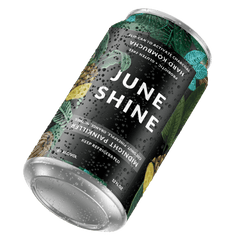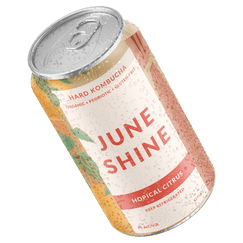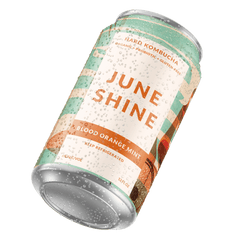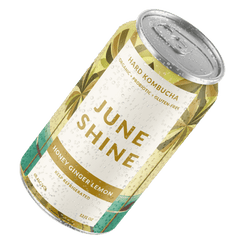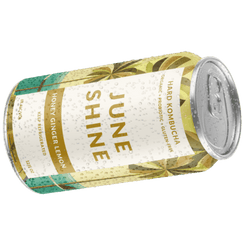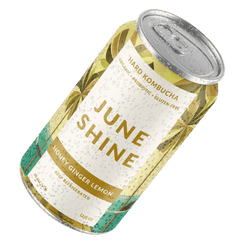The Story Behind Sustainable Honey

There’s a lot of buzz going around about sustainable honey. That’s why we’re going to dig into exactly what honey is, why it’s so important, and some common practices in the beekeeping community.
There are two schools of thought on how bees should be treated in the process of making honey. We looked into both and how the environment is affected due to their choices.
Here at JuneShine, we only use honey from reputable honey farmers. As you read on, we think you’ll understand why we are so choosy about what goes into our booch.
The Scoop on Honey
Honey is much more than just a sweet, sugary liquid you can use to enhance the flavors of foods and drinks.
Originating from the nectar and pollen collected by bees and naturally produced, millions worldwide love this substance. Whether enjoyed on a favorite breakfast food like yogurt or mixed into baked goods, honey acts as an all-natural sweetening agent, replacing refined sugar.
As consumers are becoming more aware of how food affects their health, they are taking notice of honey. Honey is becoming more popular as a healthier alternative for sugar, so the industry is expanding.
Unfortunately, instead of focusing on providing quality products, money has become the focus for many honey manufacturers. Some bee farmers are in it for the profit, and that comes at a cost for bees and our planet.
Bees play an integral role in plant pollination. As with many things in nature, they are part of a chain reaction.
Bees collect nectar and pollen from nearby plants and pollinate surrounding crops, and as consumers, we rely on crops to provide us with food. When bee farmers add themselves to this equation, the balance of nature can be interrupted. As a consequence, bees are sometimes mistreated, which would be bad enough on its own. The consequences of improper honey harvesting don’t end there, though. When crops are not pollinated properly, humans are affected by the decrease in the food supply.
Honey’s Impact on Bees
Beekeeping practices have a major impact on bees. When using ethical methods, beekeepers can support bees and their environment. Conversely, unethical beekeeping practices have significant negative consequences on both the insects and their surroundings. In mass-producing bee farms, it is common for bees to be treated inhumanely to increase honey production.
This increase of honey comes with a price tag, and that price tag is the bees’ livelihood. Bees are kept in cramped conditions rather than being allowed to pollinate freely in nature. This is mainly done to keep the queen bee from relocating to different hives.
In addition to the smaller living quarters, the queen bee often has her wings clipped by beekeepers to ensure she stays in the hive.
And that’s not all that’s done to the queen. Queen bees lay eggs based on the availability in the hive’s wax cells. Unethical bee farmers will manufacture additional cells so that the queen lays significantly more eggs than she would naturally. In order to keep up with the increased demands of egg-laying, the queen bee is artificially inseminated, causing her unnecessary stress and sometimes bodily harm.
In nature, worker bees travel between two and four miles from their hive to forage for nectar. In captivity, their foraging distances are kept to a bare minimum to keep them close to the hive.
Sustainable Honey
For honey to be sustainably made, beekeepers are required to maintain a particular standard for bees, the environment, and the quality of their products. Unfortunately, most jars of honey that you’ll find in supermarkets were not produced according to these regulations.
Sustainable honey, on the other hand, is made by farmers who truly care about bees and maintaining the critical balance between bees and nature. When ethically farmed, beehives are placed in areas away from any neighboring farms that may use pesticides. Queen and worker bees are given room to go about their duties in the hive, and honey is always left for the bees to feed on at the end of a season.
When the honey is produced and ready for distribution, it’s not watered down with additives and artificial colors or flavoring.
What Bee Farmers Are Doing
Beekeeping standards can vary greatly depending on where they are located. The European Union has set a good standard, however.
In the EU, bee farmers must adhere to a strict set of rules to maintain the livelihood of bees and their surroundings. According to these restrictions, farmers must create hives using untreated materials, and harmful plastics, glues, and paints are forbidden.
While the European Union has set an excellent example, the requirements for bee farmers are not as stringent in the U.S. However, many beekeepers here do follow regulations to obtain organic certification.
Hives are thoughtfully placed in locations that do not have any plants treated by chemicals or pesticides within a twelve-mile radius. Hives are constructed using wood, with no plastics or toxic glues. Each year, a remainder of the honey created is kept for the bees to feed on while plants are dormant. Also, the queen bees’ wings are never clipped by farmers looking to do the right thing for their colonies.
Why JuneShine Cares About Honey
At JuneShine, we have always been and will continue to be focused on providing insanely delicious kombucha without harming the environment in the process.
Sustainability is built into our business model. Each year, we donate 1% of our sales to non-profit organizations focused on improving the planet. We are focused on producing honest drinks while doing our part in creating a healthier planet.
We also only use responsible bee farmers to source our honey. This way, bees are never harmed in the production of Junies.
Check out our awesome honey source, BeeSeasonal. They provide delicious, organic honey without ever sacrificing or harming bees in the process. All of their honey production is in support of natural, regenerative beekeeping practices.
And it doesn’t stop with that. Every decision we make, from the utensils our employees use to the packaging of our hard kombucha, is focused on improving the planet. Through our partnership with Carbon Neutral, we’re proud to be completely carbon neutral, which means we are leaving the Earth with the same carbon emissions as we found it—no more, no less.
We know we aren’t the only ones who want to better the planet, so we also make sure we’re giving people something with real, transparent ingredients. All of our hard kombuchas are made with sustainably sourced, organic ingredients. Better booch means no junk and no GMOs ever. From our honey distributors to the SCOBY and sugars we use, it’s all organic and ethically sourced.
Whether you’re saving one bee at a time or an entire hive, you are making a difference. Your efforts are helping give back to the planet. Choose your honey wisely, and pick a kombucha with the same level of distinction.
Sources:
